Law for Social Work Practice: Case Study Analysis, February 2021
VerifiedAdded on 2022/12/28
|12
|3768
|97
Homework Assignment
AI Summary
This assignment delves into the legal aspects of social work practice through the examination of three case studies. The first case explores the Mental Capacity Act 2005, analyzing its five principles, assessment procedures, and relevant sections. The second case focuses on the Care Act 2014, in...
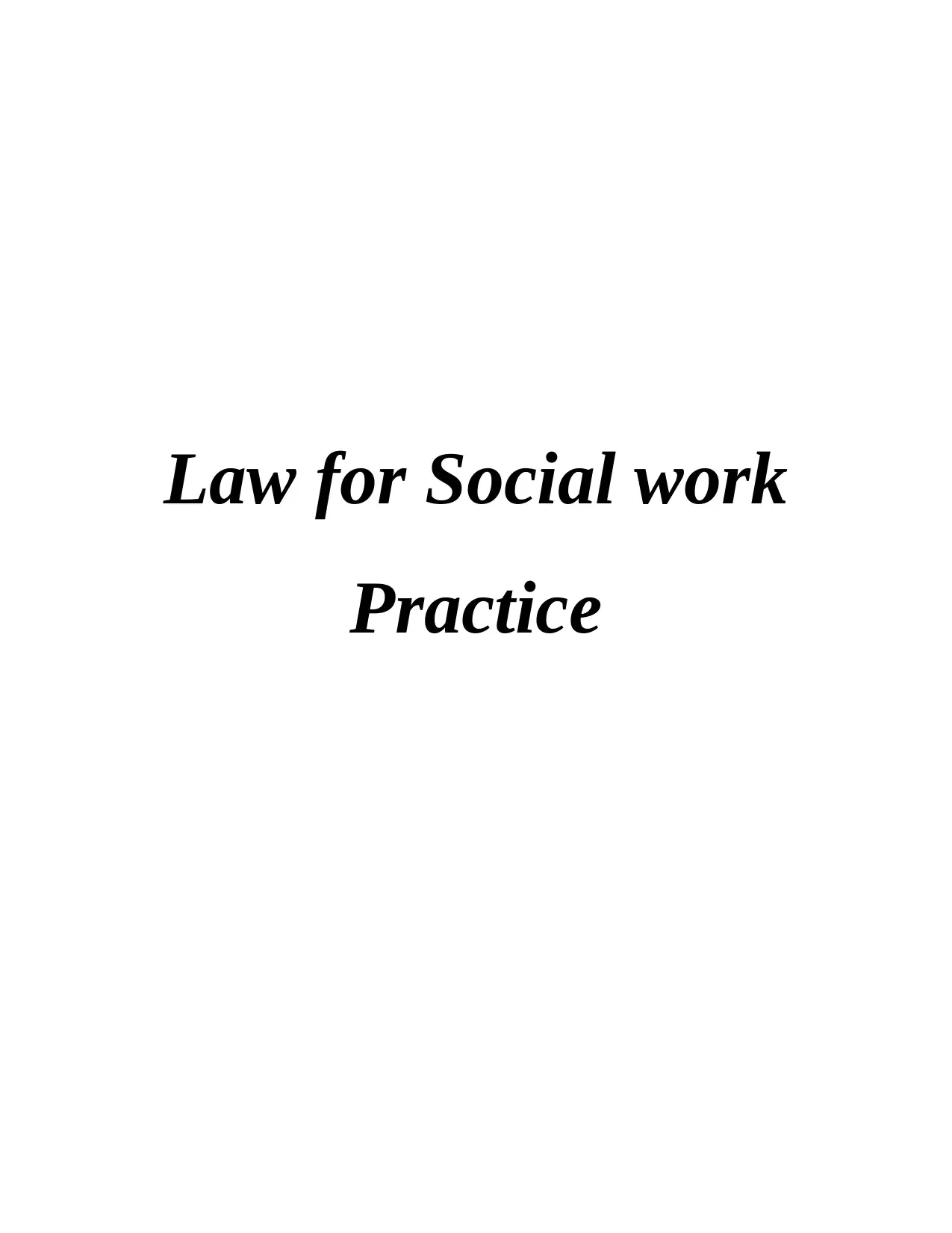
Law for Social work
Practice
Practice
Paraphrase This Document
Need a fresh take? Get an instant paraphrase of this document with our AI Paraphraser
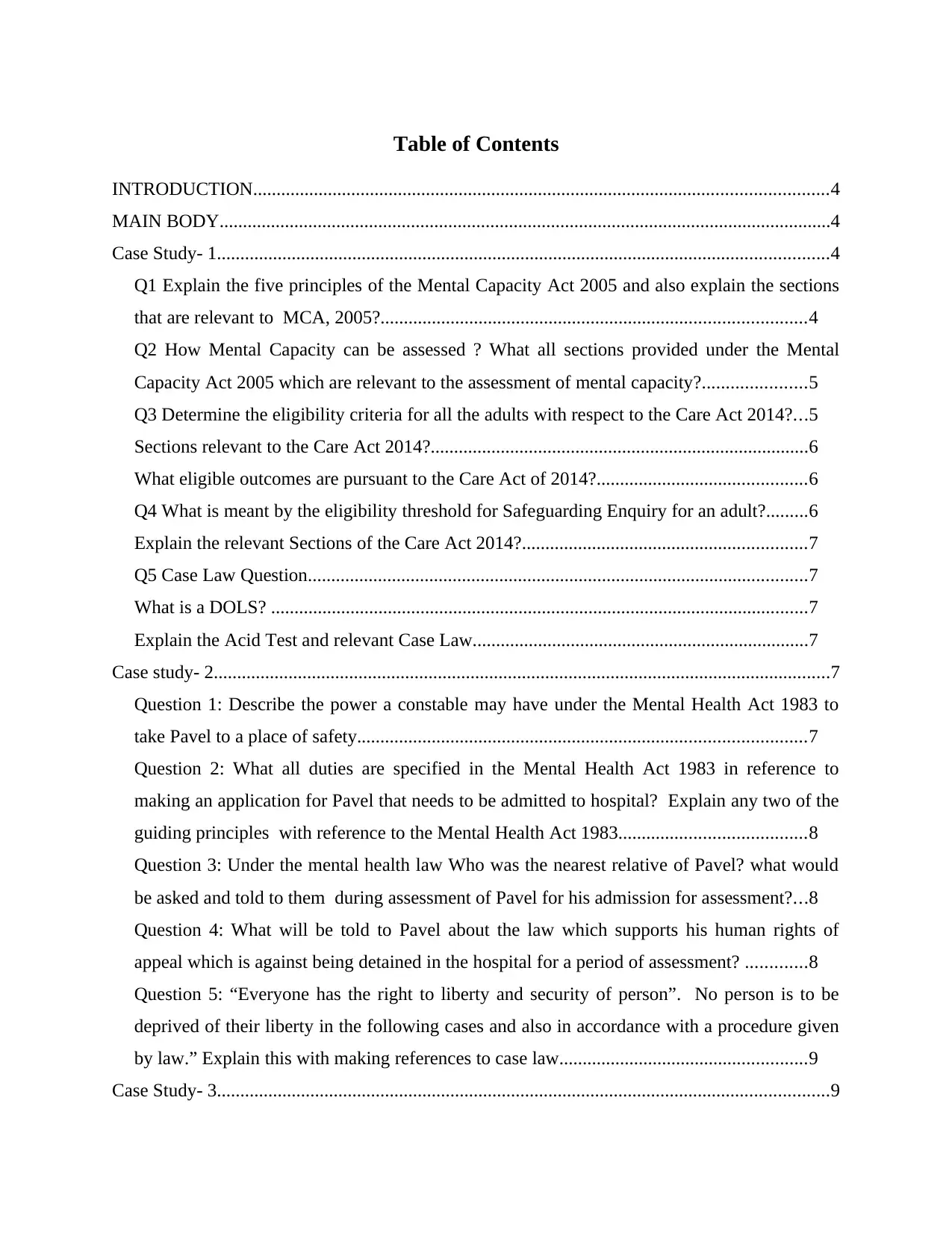
Table of Contents
INTRODUCTION...........................................................................................................................4
MAIN BODY...................................................................................................................................4
Case Study- 1...................................................................................................................................4
Q1 Explain the five principles of the Mental Capacity Act 2005 and also explain the sections
that are relevant to MCA, 2005?...........................................................................................4
Q2 How Mental Capacity can be assessed ? What all sections provided under the Mental
Capacity Act 2005 which are relevant to the assessment of mental capacity?......................5
Q3 Determine the eligibility criteria for all the adults with respect to the Care Act 2014?...5
Sections relevant to the Care Act 2014?.................................................................................6
What eligible outcomes are pursuant to the Care Act of 2014?.............................................6
Q4 What is meant by the eligibility threshold for Safeguarding Enquiry for an adult?.........6
Explain the relevant Sections of the Care Act 2014?.............................................................7
Q5 Case Law Question...........................................................................................................7
What is a DOLS? ...................................................................................................................7
Explain the Acid Test and relevant Case Law........................................................................7
Case study- 2....................................................................................................................................7
Question 1: Describe the power a constable may have under the Mental Health Act 1983 to
take Pavel to a place of safety................................................................................................7
Question 2: What all duties are specified in the Mental Health Act 1983 in reference to
making an application for Pavel that needs to be admitted to hospital? Explain any two of the
guiding principles with reference to the Mental Health Act 1983........................................8
Question 3: Under the mental health law Who was the nearest relative of Pavel? what would
be asked and told to them during assessment of Pavel for his admission for assessment?...8
Question 4: What will be told to Pavel about the law which supports his human rights of
appeal which is against being detained in the hospital for a period of assessment? .............8
Question 5: “Everyone has the right to liberty and security of person”. No person is to be
deprived of their liberty in the following cases and also in accordance with a procedure given
by law.” Explain this with making references to case law.....................................................9
Case Study- 3...................................................................................................................................9
INTRODUCTION...........................................................................................................................4
MAIN BODY...................................................................................................................................4
Case Study- 1...................................................................................................................................4
Q1 Explain the five principles of the Mental Capacity Act 2005 and also explain the sections
that are relevant to MCA, 2005?...........................................................................................4
Q2 How Mental Capacity can be assessed ? What all sections provided under the Mental
Capacity Act 2005 which are relevant to the assessment of mental capacity?......................5
Q3 Determine the eligibility criteria for all the adults with respect to the Care Act 2014?...5
Sections relevant to the Care Act 2014?.................................................................................6
What eligible outcomes are pursuant to the Care Act of 2014?.............................................6
Q4 What is meant by the eligibility threshold for Safeguarding Enquiry for an adult?.........6
Explain the relevant Sections of the Care Act 2014?.............................................................7
Q5 Case Law Question...........................................................................................................7
What is a DOLS? ...................................................................................................................7
Explain the Acid Test and relevant Case Law........................................................................7
Case study- 2....................................................................................................................................7
Question 1: Describe the power a constable may have under the Mental Health Act 1983 to
take Pavel to a place of safety................................................................................................7
Question 2: What all duties are specified in the Mental Health Act 1983 in reference to
making an application for Pavel that needs to be admitted to hospital? Explain any two of the
guiding principles with reference to the Mental Health Act 1983........................................8
Question 3: Under the mental health law Who was the nearest relative of Pavel? what would
be asked and told to them during assessment of Pavel for his admission for assessment?...8
Question 4: What will be told to Pavel about the law which supports his human rights of
appeal which is against being detained in the hospital for a period of assessment? .............8
Question 5: “Everyone has the right to liberty and security of person”. No person is to be
deprived of their liberty in the following cases and also in accordance with a procedure given
by law.” Explain this with making references to case law.....................................................9
Case Study- 3...................................................................................................................................9
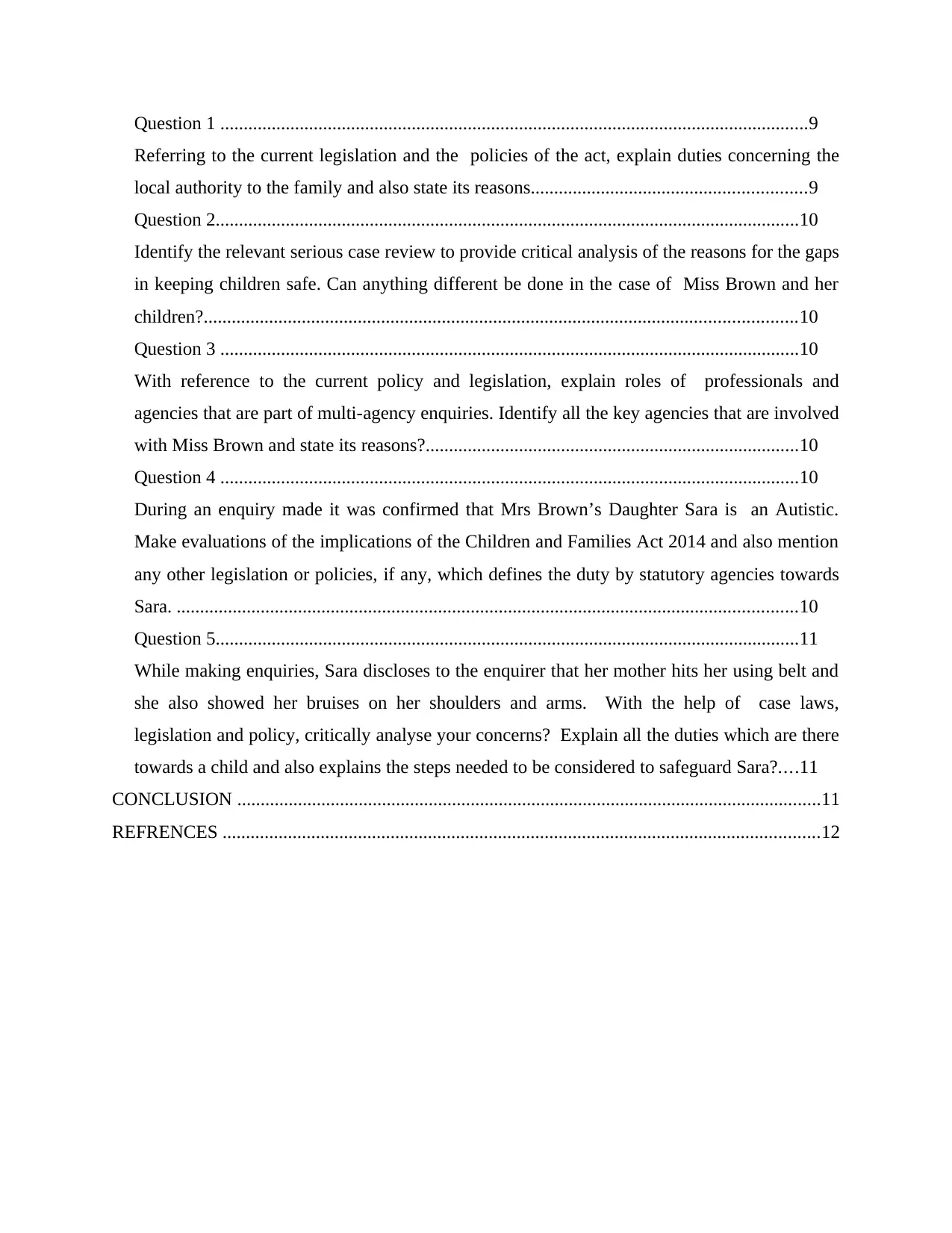
Question 1 ..............................................................................................................................9
Referring to the current legislation and the policies of the act, explain duties concerning the
local authority to the family and also state its reasons...........................................................9
Question 2.............................................................................................................................10
Identify the relevant serious case review to provide critical analysis of the reasons for the gaps
in keeping children safe. Can anything different be done in the case of Miss Brown and her
children?...............................................................................................................................10
Question 3 ............................................................................................................................10
With reference to the current policy and legislation, explain roles of professionals and
agencies that are part of multi-agency enquiries. Identify all the key agencies that are involved
with Miss Brown and state its reasons?................................................................................10
Question 4 ............................................................................................................................10
During an enquiry made it was confirmed that Mrs Brown’s Daughter Sara is an Autistic.
Make evaluations of the implications of the Children and Families Act 2014 and also mention
any other legislation or policies, if any, which defines the duty by statutory agencies towards
Sara. .....................................................................................................................................10
Question 5.............................................................................................................................11
While making enquiries, Sara discloses to the enquirer that her mother hits her using belt and
she also showed her bruises on her shoulders and arms. With the help of case laws,
legislation and policy, critically analyse your concerns? Explain all the duties which are there
towards a child and also explains the steps needed to be considered to safeguard Sara?....11
CONCLUSION .............................................................................................................................11
REFRENCES ................................................................................................................................12
Referring to the current legislation and the policies of the act, explain duties concerning the
local authority to the family and also state its reasons...........................................................9
Question 2.............................................................................................................................10
Identify the relevant serious case review to provide critical analysis of the reasons for the gaps
in keeping children safe. Can anything different be done in the case of Miss Brown and her
children?...............................................................................................................................10
Question 3 ............................................................................................................................10
With reference to the current policy and legislation, explain roles of professionals and
agencies that are part of multi-agency enquiries. Identify all the key agencies that are involved
with Miss Brown and state its reasons?................................................................................10
Question 4 ............................................................................................................................10
During an enquiry made it was confirmed that Mrs Brown’s Daughter Sara is an Autistic.
Make evaluations of the implications of the Children and Families Act 2014 and also mention
any other legislation or policies, if any, which defines the duty by statutory agencies towards
Sara. .....................................................................................................................................10
Question 5.............................................................................................................................11
While making enquiries, Sara discloses to the enquirer that her mother hits her using belt and
she also showed her bruises on her shoulders and arms. With the help of case laws,
legislation and policy, critically analyse your concerns? Explain all the duties which are there
towards a child and also explains the steps needed to be considered to safeguard Sara?....11
CONCLUSION .............................................................................................................................11
REFRENCES ................................................................................................................................12
⊘ This is a preview!⊘
Do you want full access?
Subscribe today to unlock all pages.

Trusted by 1+ million students worldwide
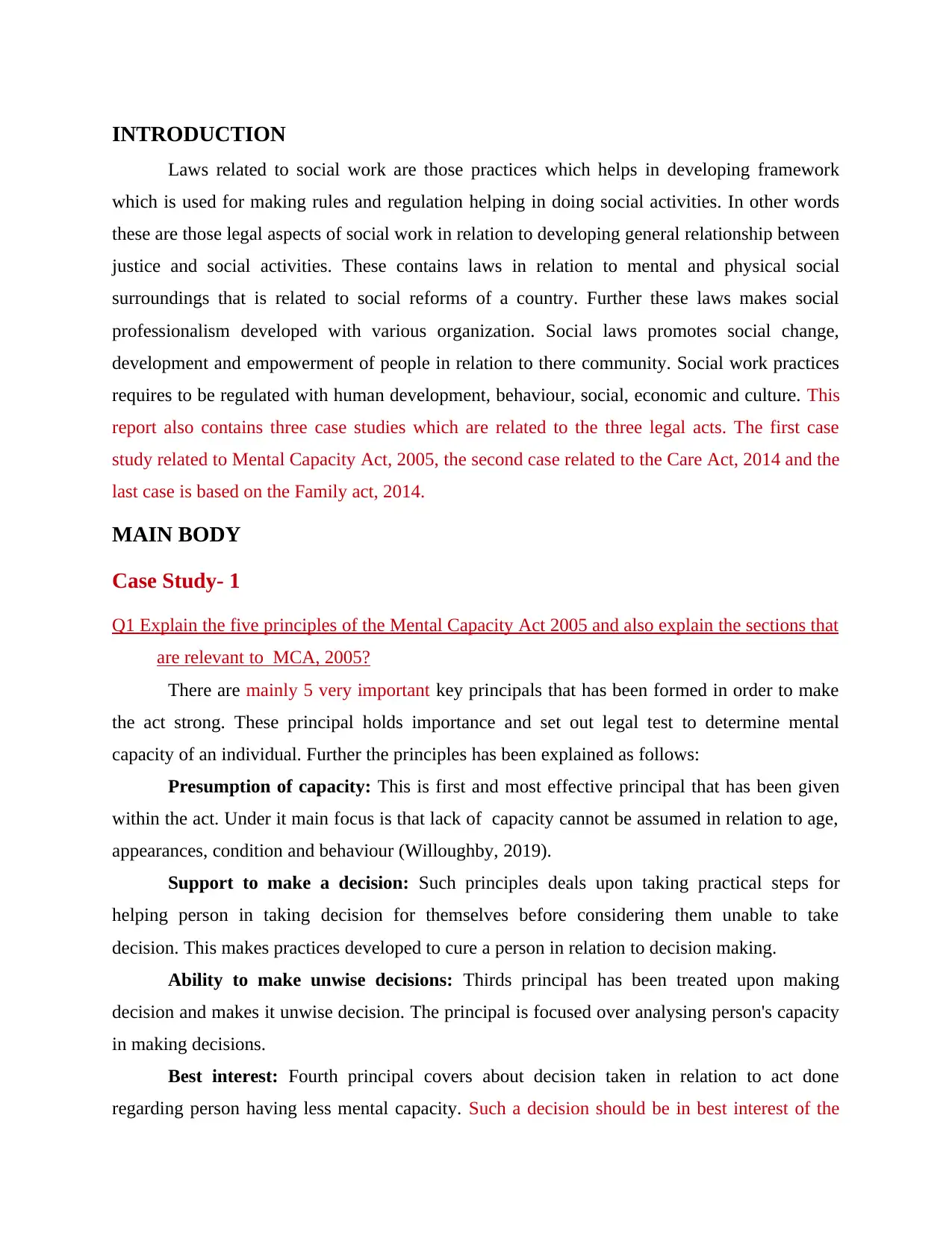
INTRODUCTION
Laws related to social work are those practices which helps in developing framework
which is used for making rules and regulation helping in doing social activities. In other words
these are those legal aspects of social work in relation to developing general relationship between
justice and social activities. These contains laws in relation to mental and physical social
surroundings that is related to social reforms of a country. Further these laws makes social
professionalism developed with various organization. Social laws promotes social change,
development and empowerment of people in relation to there community. Social work practices
requires to be regulated with human development, behaviour, social, economic and culture. This
report also contains three case studies which are related to the three legal acts. The first case
study related to Mental Capacity Act, 2005, the second case related to the Care Act, 2014 and the
last case is based on the Family act, 2014.
MAIN BODY
Case Study- 1
Q1 Explain the five principles of the Mental Capacity Act 2005 and also explain the sections that
are relevant to MCA, 2005?
There are mainly 5 very important key principals that has been formed in order to make
the act strong. These principal holds importance and set out legal test to determine mental
capacity of an individual. Further the principles has been explained as follows:
Presumption of capacity: This is first and most effective principal that has been given
within the act. Under it main focus is that lack of capacity cannot be assumed in relation to age,
appearances, condition and behaviour (Willoughby, 2019).
Support to make a decision: Such principles deals upon taking practical steps for
helping person in taking decision for themselves before considering them unable to take
decision. This makes practices developed to cure a person in relation to decision making.
Ability to make unwise decisions: Thirds principal has been treated upon making
decision and makes it unwise decision. The principal is focused over analysing person's capacity
in making decisions.
Best interest: Fourth principal covers about decision taken in relation to act done
regarding person having less mental capacity. Such a decision should be in best interest of the
Laws related to social work are those practices which helps in developing framework
which is used for making rules and regulation helping in doing social activities. In other words
these are those legal aspects of social work in relation to developing general relationship between
justice and social activities. These contains laws in relation to mental and physical social
surroundings that is related to social reforms of a country. Further these laws makes social
professionalism developed with various organization. Social laws promotes social change,
development and empowerment of people in relation to there community. Social work practices
requires to be regulated with human development, behaviour, social, economic and culture. This
report also contains three case studies which are related to the three legal acts. The first case
study related to Mental Capacity Act, 2005, the second case related to the Care Act, 2014 and the
last case is based on the Family act, 2014.
MAIN BODY
Case Study- 1
Q1 Explain the five principles of the Mental Capacity Act 2005 and also explain the sections that
are relevant to MCA, 2005?
There are mainly 5 very important key principals that has been formed in order to make
the act strong. These principal holds importance and set out legal test to determine mental
capacity of an individual. Further the principles has been explained as follows:
Presumption of capacity: This is first and most effective principal that has been given
within the act. Under it main focus is that lack of capacity cannot be assumed in relation to age,
appearances, condition and behaviour (Willoughby, 2019).
Support to make a decision: Such principles deals upon taking practical steps for
helping person in taking decision for themselves before considering them unable to take
decision. This makes practices developed to cure a person in relation to decision making.
Ability to make unwise decisions: Thirds principal has been treated upon making
decision and makes it unwise decision. The principal is focused over analysing person's capacity
in making decisions.
Best interest: Fourth principal covers about decision taken in relation to act done
regarding person having less mental capacity. Such a decision should be in best interest of the
Paraphrase This Document
Need a fresh take? Get an instant paraphrase of this document with our AI Paraphraser
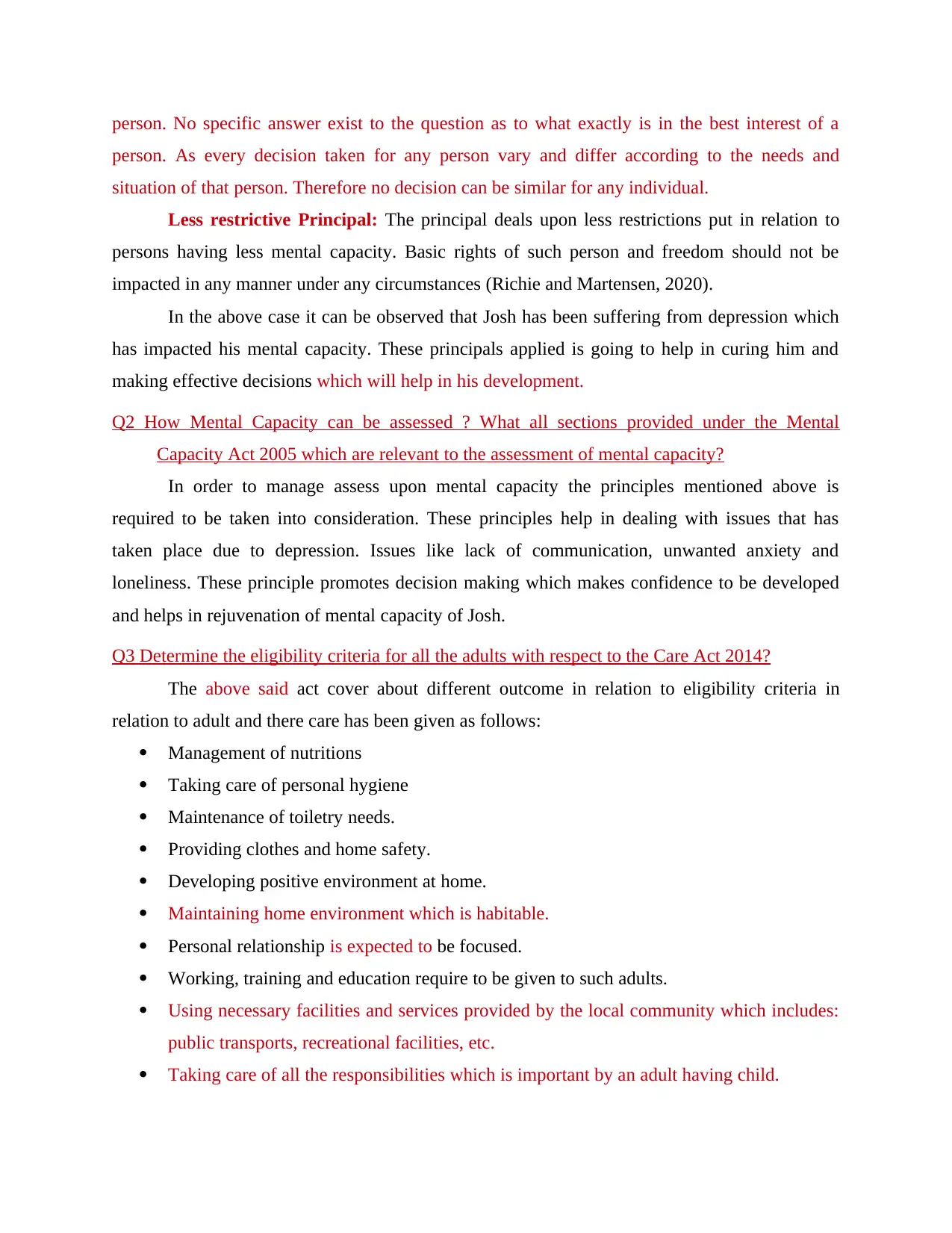
person. No specific answer exist to the question as to what exactly is in the best interest of a
person. As every decision taken for any person vary and differ according to the needs and
situation of that person. Therefore no decision can be similar for any individual.
Less restrictive Principal: The principal deals upon less restrictions put in relation to
persons having less mental capacity. Basic rights of such person and freedom should not be
impacted in any manner under any circumstances (Richie and Martensen, 2020).
In the above case it can be observed that Josh has been suffering from depression which
has impacted his mental capacity. These principals applied is going to help in curing him and
making effective decisions which will help in his development.
Q2 How Mental Capacity can be assessed ? What all sections provided under the Mental
Capacity Act 2005 which are relevant to the assessment of mental capacity?
In order to manage assess upon mental capacity the principles mentioned above is
required to be taken into consideration. These principles help in dealing with issues that has
taken place due to depression. Issues like lack of communication, unwanted anxiety and
loneliness. These principle promotes decision making which makes confidence to be developed
and helps in rejuvenation of mental capacity of Josh.
Q3 Determine the eligibility criteria for all the adults with respect to the Care Act 2014?
The above said act cover about different outcome in relation to eligibility criteria in
relation to adult and there care has been given as follows:
Management of nutritions
Taking care of personal hygiene
Maintenance of toiletry needs.
Providing clothes and home safety.
Developing positive environment at home.
Maintaining home environment which is habitable.
Personal relationship is expected to be focused.
Working, training and education require to be given to such adults.
Using necessary facilities and services provided by the local community which includes:
public transports, recreational facilities, etc.
Taking care of all the responsibilities which is important by an adult having child.
person. As every decision taken for any person vary and differ according to the needs and
situation of that person. Therefore no decision can be similar for any individual.
Less restrictive Principal: The principal deals upon less restrictions put in relation to
persons having less mental capacity. Basic rights of such person and freedom should not be
impacted in any manner under any circumstances (Richie and Martensen, 2020).
In the above case it can be observed that Josh has been suffering from depression which
has impacted his mental capacity. These principals applied is going to help in curing him and
making effective decisions which will help in his development.
Q2 How Mental Capacity can be assessed ? What all sections provided under the Mental
Capacity Act 2005 which are relevant to the assessment of mental capacity?
In order to manage assess upon mental capacity the principles mentioned above is
required to be taken into consideration. These principles help in dealing with issues that has
taken place due to depression. Issues like lack of communication, unwanted anxiety and
loneliness. These principle promotes decision making which makes confidence to be developed
and helps in rejuvenation of mental capacity of Josh.
Q3 Determine the eligibility criteria for all the adults with respect to the Care Act 2014?
The above said act cover about different outcome in relation to eligibility criteria in
relation to adult and there care has been given as follows:
Management of nutritions
Taking care of personal hygiene
Maintenance of toiletry needs.
Providing clothes and home safety.
Developing positive environment at home.
Maintaining home environment which is habitable.
Personal relationship is expected to be focused.
Working, training and education require to be given to such adults.
Using necessary facilities and services provided by the local community which includes:
public transports, recreational facilities, etc.
Taking care of all the responsibilities which is important by an adult having child.
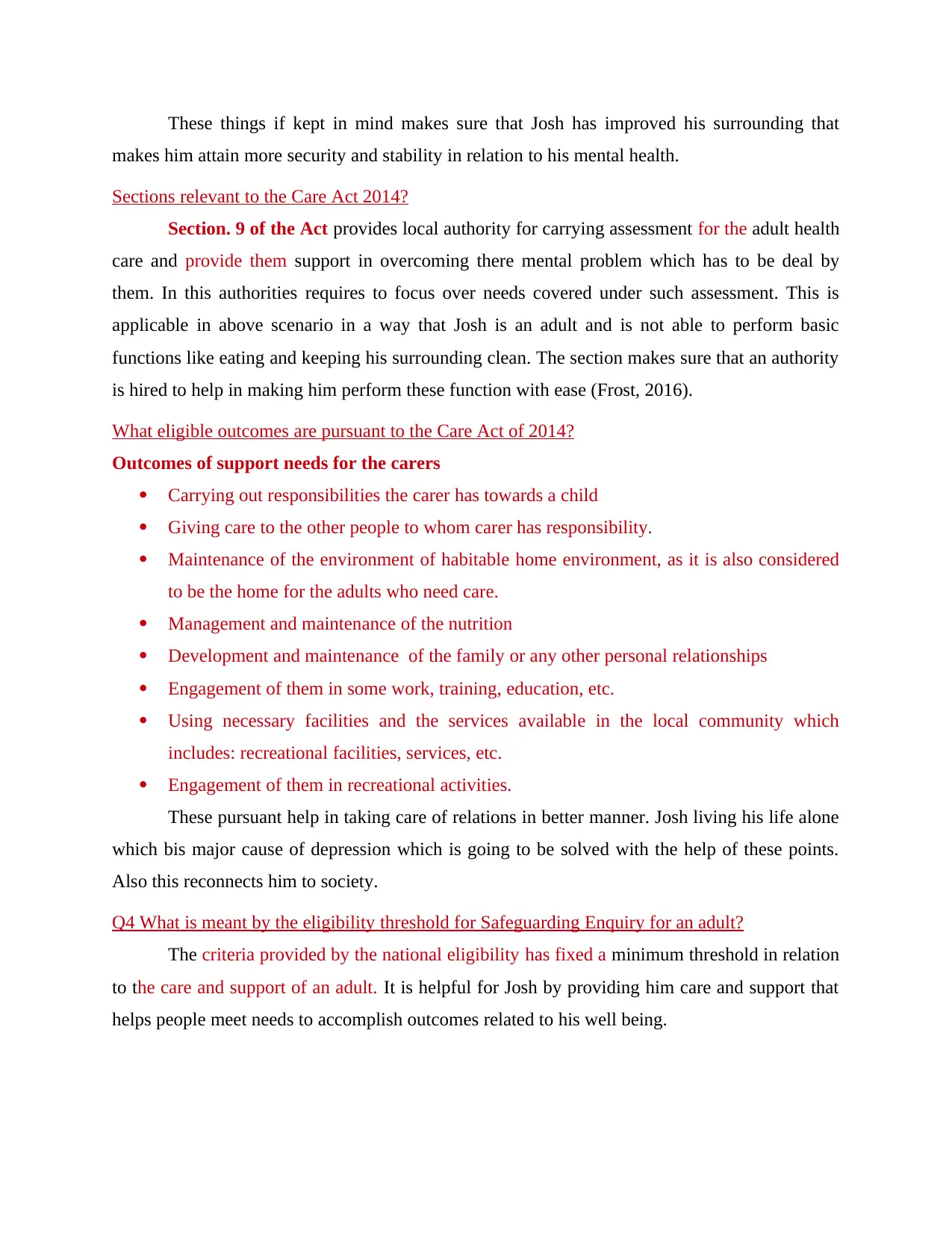
These things if kept in mind makes sure that Josh has improved his surrounding that
makes him attain more security and stability in relation to his mental health.
Sections relevant to the Care Act 2014?
Section. 9 of the Act provides local authority for carrying assessment for the adult health
care and provide them support in overcoming there mental problem which has to be deal by
them. In this authorities requires to focus over needs covered under such assessment. This is
applicable in above scenario in a way that Josh is an adult and is not able to perform basic
functions like eating and keeping his surrounding clean. The section makes sure that an authority
is hired to help in making him perform these function with ease (Frost, 2016).
What eligible outcomes are pursuant to the Care Act of 2014?
Outcomes of support needs for the carers
Carrying out responsibilities the carer has towards a child
Giving care to the other people to whom carer has responsibility.
Maintenance of the environment of habitable home environment, as it is also considered
to be the home for the adults who need care.
Management and maintenance of the nutrition
Development and maintenance of the family or any other personal relationships
Engagement of them in some work, training, education, etc.
Using necessary facilities and the services available in the local community which
includes: recreational facilities, services, etc.
Engagement of them in recreational activities.
These pursuant help in taking care of relations in better manner. Josh living his life alone
which bis major cause of depression which is going to be solved with the help of these points.
Also this reconnects him to society.
Q4 What is meant by the eligibility threshold for Safeguarding Enquiry for an adult?
The criteria provided by the national eligibility has fixed a minimum threshold in relation
to the care and support of an adult. It is helpful for Josh by providing him care and support that
helps people meet needs to accomplish outcomes related to his well being.
makes him attain more security and stability in relation to his mental health.
Sections relevant to the Care Act 2014?
Section. 9 of the Act provides local authority for carrying assessment for the adult health
care and provide them support in overcoming there mental problem which has to be deal by
them. In this authorities requires to focus over needs covered under such assessment. This is
applicable in above scenario in a way that Josh is an adult and is not able to perform basic
functions like eating and keeping his surrounding clean. The section makes sure that an authority
is hired to help in making him perform these function with ease (Frost, 2016).
What eligible outcomes are pursuant to the Care Act of 2014?
Outcomes of support needs for the carers
Carrying out responsibilities the carer has towards a child
Giving care to the other people to whom carer has responsibility.
Maintenance of the environment of habitable home environment, as it is also considered
to be the home for the adults who need care.
Management and maintenance of the nutrition
Development and maintenance of the family or any other personal relationships
Engagement of them in some work, training, education, etc.
Using necessary facilities and the services available in the local community which
includes: recreational facilities, services, etc.
Engagement of them in recreational activities.
These pursuant help in taking care of relations in better manner. Josh living his life alone
which bis major cause of depression which is going to be solved with the help of these points.
Also this reconnects him to society.
Q4 What is meant by the eligibility threshold for Safeguarding Enquiry for an adult?
The criteria provided by the national eligibility has fixed a minimum threshold in relation
to the care and support of an adult. It is helpful for Josh by providing him care and support that
helps people meet needs to accomplish outcomes related to his well being.
⊘ This is a preview!⊘
Do you want full access?
Subscribe today to unlock all pages.

Trusted by 1+ million students worldwide
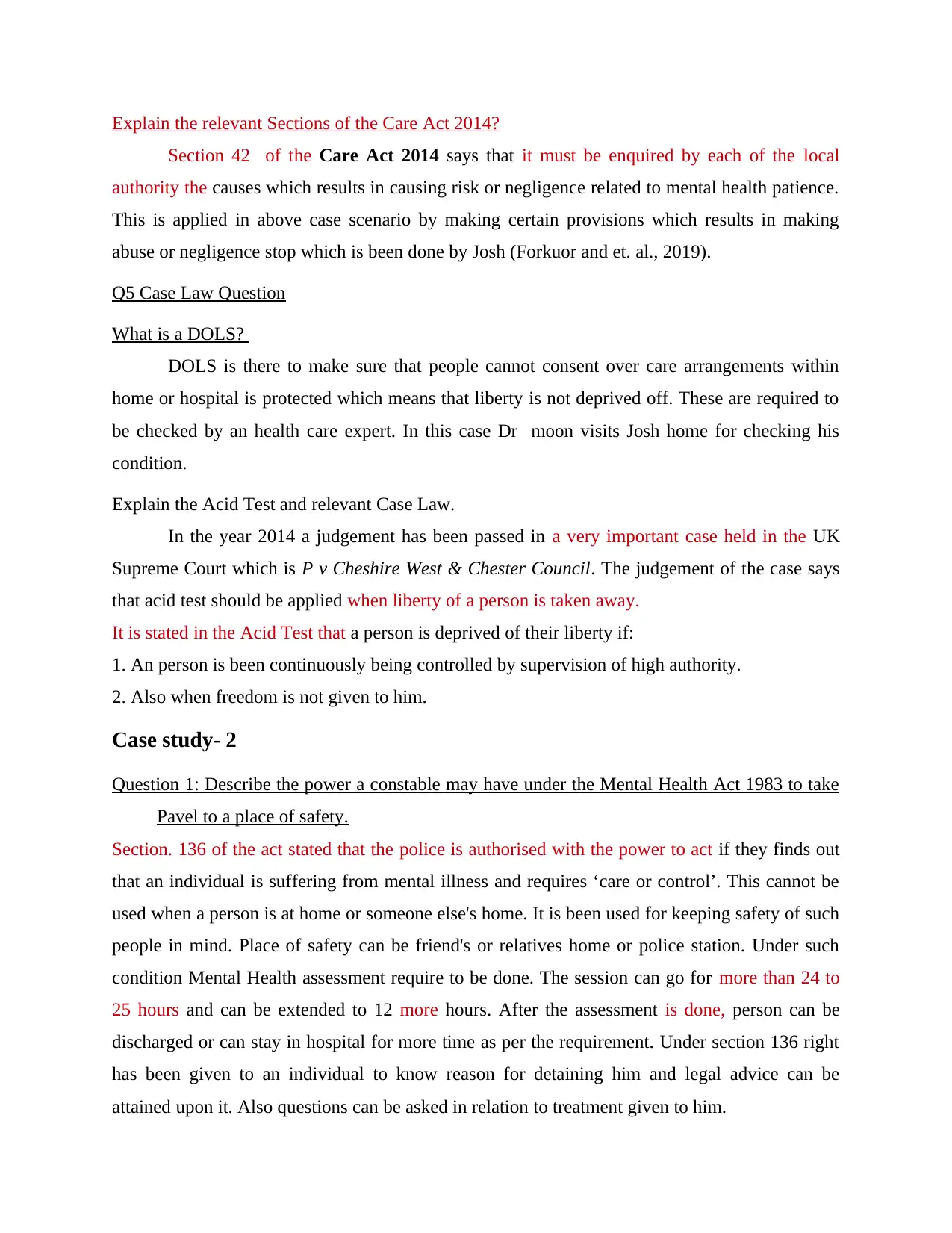
Explain the relevant Sections of the Care Act 2014?
Section 42 of the Care Act 2014 says that it must be enquired by each of the local
authority the causes which results in causing risk or negligence related to mental health patience.
This is applied in above case scenario by making certain provisions which results in making
abuse or negligence stop which is been done by Josh (Forkuor and et. al., 2019).
Q5 Case Law Question
What is a DOLS?
DOLS is there to make sure that people cannot consent over care arrangements within
home or hospital is protected which means that liberty is not deprived off. These are required to
be checked by an health care expert. In this case Dr moon visits Josh home for checking his
condition.
Explain the Acid Test and relevant Case Law.
In the year 2014 a judgement has been passed in a very important case held in the UK
Supreme Court which is P v Cheshire West & Chester Council. The judgement of the case says
that acid test should be applied when liberty of a person is taken away.
It is stated in the Acid Test that a person is deprived of their liberty if:
1. An person is been continuously being controlled by supervision of high authority.
2. Also when freedom is not given to him.
Case study- 2
Question 1: Describe the power a constable may have under the Mental Health Act 1983 to take
Pavel to a place of safety.
Section. 136 of the act stated that the police is authorised with the power to act if they finds out
that an individual is suffering from mental illness and requires ‘care or control’. This cannot be
used when a person is at home or someone else's home. It is been used for keeping safety of such
people in mind. Place of safety can be friend's or relatives home or police station. Under such
condition Mental Health assessment require to be done. The session can go for more than 24 to
25 hours and can be extended to 12 more hours. After the assessment is done, person can be
discharged or can stay in hospital for more time as per the requirement. Under section 136 right
has been given to an individual to know reason for detaining him and legal advice can be
attained upon it. Also questions can be asked in relation to treatment given to him.
Section 42 of the Care Act 2014 says that it must be enquired by each of the local
authority the causes which results in causing risk or negligence related to mental health patience.
This is applied in above case scenario by making certain provisions which results in making
abuse or negligence stop which is been done by Josh (Forkuor and et. al., 2019).
Q5 Case Law Question
What is a DOLS?
DOLS is there to make sure that people cannot consent over care arrangements within
home or hospital is protected which means that liberty is not deprived off. These are required to
be checked by an health care expert. In this case Dr moon visits Josh home for checking his
condition.
Explain the Acid Test and relevant Case Law.
In the year 2014 a judgement has been passed in a very important case held in the UK
Supreme Court which is P v Cheshire West & Chester Council. The judgement of the case says
that acid test should be applied when liberty of a person is taken away.
It is stated in the Acid Test that a person is deprived of their liberty if:
1. An person is been continuously being controlled by supervision of high authority.
2. Also when freedom is not given to him.
Case study- 2
Question 1: Describe the power a constable may have under the Mental Health Act 1983 to take
Pavel to a place of safety.
Section. 136 of the act stated that the police is authorised with the power to act if they finds out
that an individual is suffering from mental illness and requires ‘care or control’. This cannot be
used when a person is at home or someone else's home. It is been used for keeping safety of such
people in mind. Place of safety can be friend's or relatives home or police station. Under such
condition Mental Health assessment require to be done. The session can go for more than 24 to
25 hours and can be extended to 12 more hours. After the assessment is done, person can be
discharged or can stay in hospital for more time as per the requirement. Under section 136 right
has been given to an individual to know reason for detaining him and legal advice can be
attained upon it. Also questions can be asked in relation to treatment given to him.
Paraphrase This Document
Need a fresh take? Get an instant paraphrase of this document with our AI Paraphraser
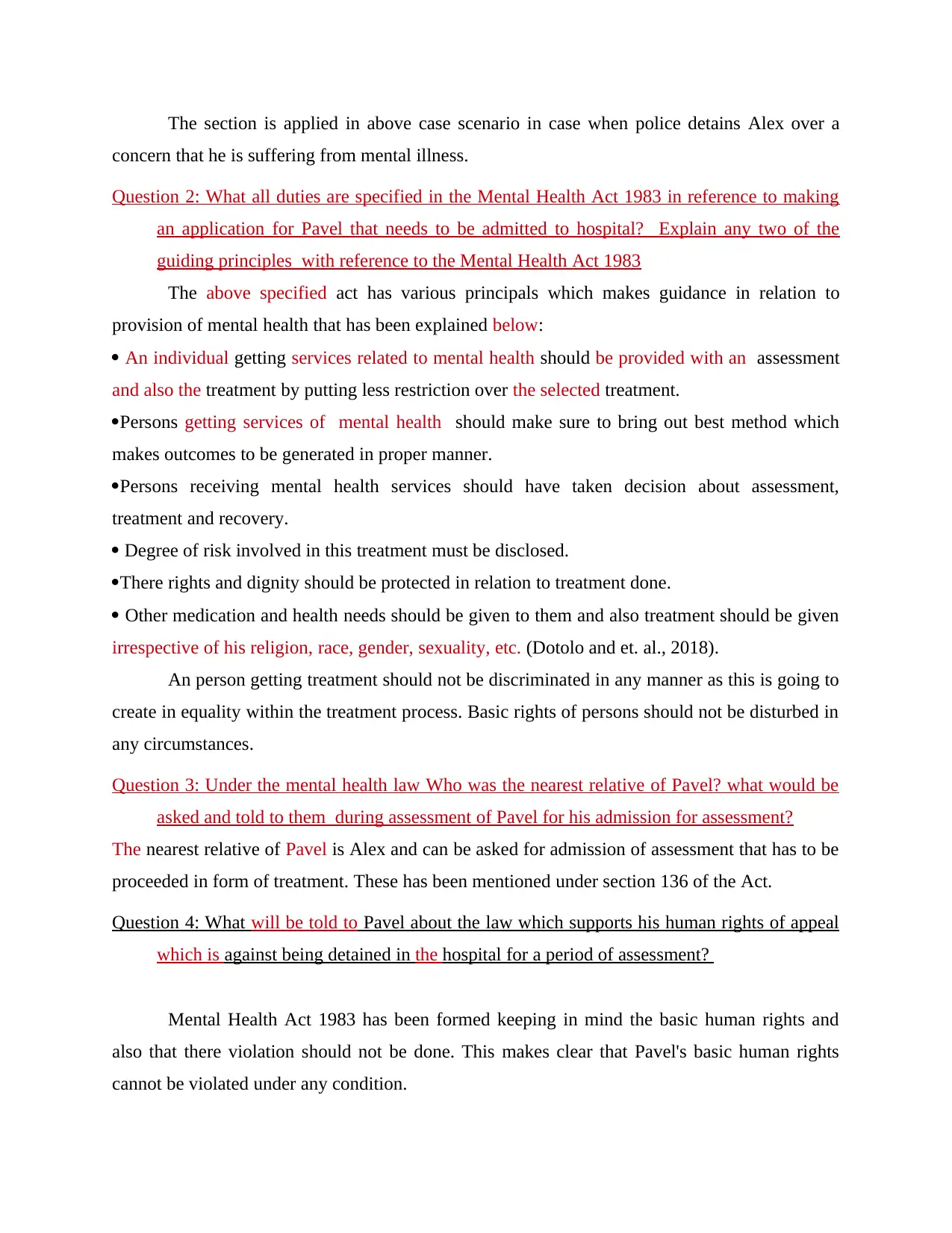
The section is applied in above case scenario in case when police detains Alex over a
concern that he is suffering from mental illness.
Question 2: What all duties are specified in the Mental Health Act 1983 in reference to making
an application for Pavel that needs to be admitted to hospital? Explain any two of the
guiding principles with reference to the Mental Health Act 1983
The above specified act has various principals which makes guidance in relation to
provision of mental health that has been explained below:
An individual getting services related to mental health should be provided with an assessment
and also the treatment by putting less restriction over the selected treatment.
Persons getting services of mental health should make sure to bring out best method which
makes outcomes to be generated in proper manner.
Persons receiving mental health services should have taken decision about assessment,
treatment and recovery.
Degree of risk involved in this treatment must be disclosed.
There rights and dignity should be protected in relation to treatment done.
Other medication and health needs should be given to them and also treatment should be given
irrespective of his religion, race, gender, sexuality, etc. (Dotolo and et. al., 2018).
An person getting treatment should not be discriminated in any manner as this is going to
create in equality within the treatment process. Basic rights of persons should not be disturbed in
any circumstances.
Question 3: Under the mental health law Who was the nearest relative of Pavel? what would be
asked and told to them during assessment of Pavel for his admission for assessment?
The nearest relative of Pavel is Alex and can be asked for admission of assessment that has to be
proceeded in form of treatment. These has been mentioned under section 136 of the Act.
Question 4: What will be told to Pavel about the law which supports his human rights of appeal
which is against being detained in the hospital for a period of assessment?
Mental Health Act 1983 has been formed keeping in mind the basic human rights and
also that there violation should not be done. This makes clear that Pavel's basic human rights
cannot be violated under any condition.
concern that he is suffering from mental illness.
Question 2: What all duties are specified in the Mental Health Act 1983 in reference to making
an application for Pavel that needs to be admitted to hospital? Explain any two of the
guiding principles with reference to the Mental Health Act 1983
The above specified act has various principals which makes guidance in relation to
provision of mental health that has been explained below:
An individual getting services related to mental health should be provided with an assessment
and also the treatment by putting less restriction over the selected treatment.
Persons getting services of mental health should make sure to bring out best method which
makes outcomes to be generated in proper manner.
Persons receiving mental health services should have taken decision about assessment,
treatment and recovery.
Degree of risk involved in this treatment must be disclosed.
There rights and dignity should be protected in relation to treatment done.
Other medication and health needs should be given to them and also treatment should be given
irrespective of his religion, race, gender, sexuality, etc. (Dotolo and et. al., 2018).
An person getting treatment should not be discriminated in any manner as this is going to
create in equality within the treatment process. Basic rights of persons should not be disturbed in
any circumstances.
Question 3: Under the mental health law Who was the nearest relative of Pavel? what would be
asked and told to them during assessment of Pavel for his admission for assessment?
The nearest relative of Pavel is Alex and can be asked for admission of assessment that has to be
proceeded in form of treatment. These has been mentioned under section 136 of the Act.
Question 4: What will be told to Pavel about the law which supports his human rights of appeal
which is against being detained in the hospital for a period of assessment?
Mental Health Act 1983 has been formed keeping in mind the basic human rights and
also that there violation should not be done. This makes clear that Pavel's basic human rights
cannot be violated under any condition.
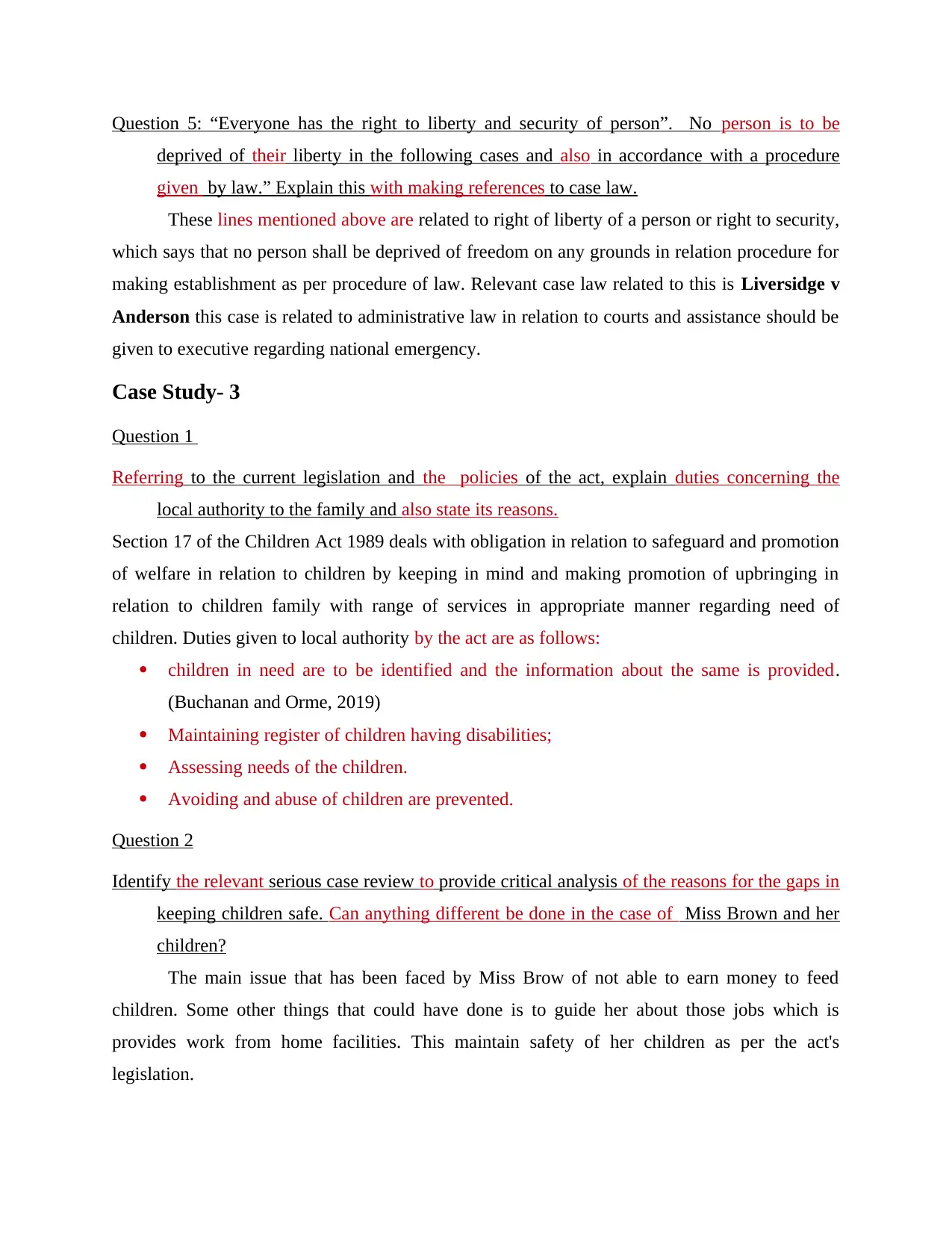
Question 5: “Everyone has the right to liberty and security of person”. No person is to be
deprived of their liberty in the following cases and also in accordance with a procedure
given by law.” Explain this with making references to case law.
These lines mentioned above are related to right of liberty of a person or right to security,
which says that no person shall be deprived of freedom on any grounds in relation procedure for
making establishment as per procedure of law. Relevant case law related to this is Liversidge v
Anderson this case is related to administrative law in relation to courts and assistance should be
given to executive regarding national emergency.
Case Study- 3
Question 1
Referring to the current legislation and the policies of the act, explain duties concerning the
local authority to the family and also state its reasons.
Section 17 of the Children Act 1989 deals with obligation in relation to safeguard and promotion
of welfare in relation to children by keeping in mind and making promotion of upbringing in
relation to children family with range of services in appropriate manner regarding need of
children. Duties given to local authority by the act are as follows:
children in need are to be identified and the information about the same is provided.
(Buchanan and Orme, 2019)
Maintaining register of children having disabilities;
Assessing needs of the children.
Avoiding and abuse of children are prevented.
Question 2
Identify the relevant serious case review to provide critical analysis of the reasons for the gaps in
keeping children safe. Can anything different be done in the case of Miss Brown and her
children?
The main issue that has been faced by Miss Brow of not able to earn money to feed
children. Some other things that could have done is to guide her about those jobs which is
provides work from home facilities. This maintain safety of her children as per the act's
legislation.
deprived of their liberty in the following cases and also in accordance with a procedure
given by law.” Explain this with making references to case law.
These lines mentioned above are related to right of liberty of a person or right to security,
which says that no person shall be deprived of freedom on any grounds in relation procedure for
making establishment as per procedure of law. Relevant case law related to this is Liversidge v
Anderson this case is related to administrative law in relation to courts and assistance should be
given to executive regarding national emergency.
Case Study- 3
Question 1
Referring to the current legislation and the policies of the act, explain duties concerning the
local authority to the family and also state its reasons.
Section 17 of the Children Act 1989 deals with obligation in relation to safeguard and promotion
of welfare in relation to children by keeping in mind and making promotion of upbringing in
relation to children family with range of services in appropriate manner regarding need of
children. Duties given to local authority by the act are as follows:
children in need are to be identified and the information about the same is provided.
(Buchanan and Orme, 2019)
Maintaining register of children having disabilities;
Assessing needs of the children.
Avoiding and abuse of children are prevented.
Question 2
Identify the relevant serious case review to provide critical analysis of the reasons for the gaps in
keeping children safe. Can anything different be done in the case of Miss Brown and her
children?
The main issue that has been faced by Miss Brow of not able to earn money to feed
children. Some other things that could have done is to guide her about those jobs which is
provides work from home facilities. This maintain safety of her children as per the act's
legislation.
⊘ This is a preview!⊘
Do you want full access?
Subscribe today to unlock all pages.

Trusted by 1+ million students worldwide
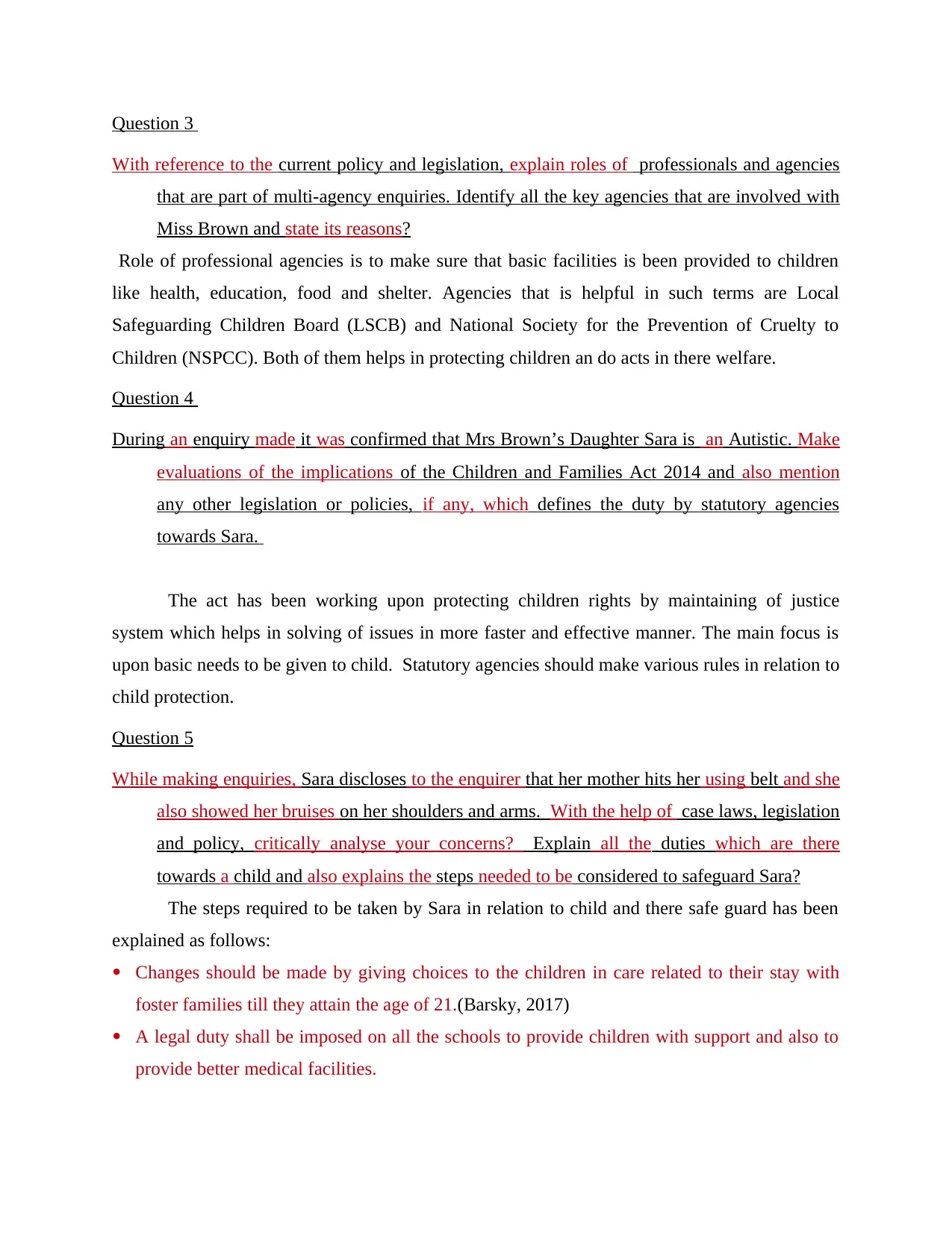
Question 3
With reference to the current policy and legislation, explain roles of professionals and agencies
that are part of multi-agency enquiries. Identify all the key agencies that are involved with
Miss Brown and state its reasons?
Role of professional agencies is to make sure that basic facilities is been provided to children
like health, education, food and shelter. Agencies that is helpful in such terms are Local
Safeguarding Children Board (LSCB) and National Society for the Prevention of Cruelty to
Children (NSPCC). Both of them helps in protecting children an do acts in there welfare.
Question 4
During an enquiry made it was confirmed that Mrs Brown’s Daughter Sara is an Autistic. Make
evaluations of the implications of the Children and Families Act 2014 and also mention
any other legislation or policies, if any, which defines the duty by statutory agencies
towards Sara.
The act has been working upon protecting children rights by maintaining of justice
system which helps in solving of issues in more faster and effective manner. The main focus is
upon basic needs to be given to child. Statutory agencies should make various rules in relation to
child protection.
Question 5
While making enquiries, Sara discloses to the enquirer that her mother hits her using belt and she
also showed her bruises on her shoulders and arms. With the help of case laws, legislation
and policy, critically analyse your concerns? Explain all the duties which are there
towards a child and also explains the steps needed to be considered to safeguard Sara?
The steps required to be taken by Sara in relation to child and there safe guard has been
explained as follows:
Changes should be made by giving choices to the children in care related to their stay with
foster families till they attain the age of 21.(Barsky, 2017)
A legal duty shall be imposed on all the schools to provide children with support and also to
provide better medical facilities.
With reference to the current policy and legislation, explain roles of professionals and agencies
that are part of multi-agency enquiries. Identify all the key agencies that are involved with
Miss Brown and state its reasons?
Role of professional agencies is to make sure that basic facilities is been provided to children
like health, education, food and shelter. Agencies that is helpful in such terms are Local
Safeguarding Children Board (LSCB) and National Society for the Prevention of Cruelty to
Children (NSPCC). Both of them helps in protecting children an do acts in there welfare.
Question 4
During an enquiry made it was confirmed that Mrs Brown’s Daughter Sara is an Autistic. Make
evaluations of the implications of the Children and Families Act 2014 and also mention
any other legislation or policies, if any, which defines the duty by statutory agencies
towards Sara.
The act has been working upon protecting children rights by maintaining of justice
system which helps in solving of issues in more faster and effective manner. The main focus is
upon basic needs to be given to child. Statutory agencies should make various rules in relation to
child protection.
Question 5
While making enquiries, Sara discloses to the enquirer that her mother hits her using belt and she
also showed her bruises on her shoulders and arms. With the help of case laws, legislation
and policy, critically analyse your concerns? Explain all the duties which are there
towards a child and also explains the steps needed to be considered to safeguard Sara?
The steps required to be taken by Sara in relation to child and there safe guard has been
explained as follows:
Changes should be made by giving choices to the children in care related to their stay with
foster families till they attain the age of 21.(Barsky, 2017)
A legal duty shall be imposed on all the schools to provide children with support and also to
provide better medical facilities.
Paraphrase This Document
Need a fresh take? Get an instant paraphrase of this document with our AI Paraphraser
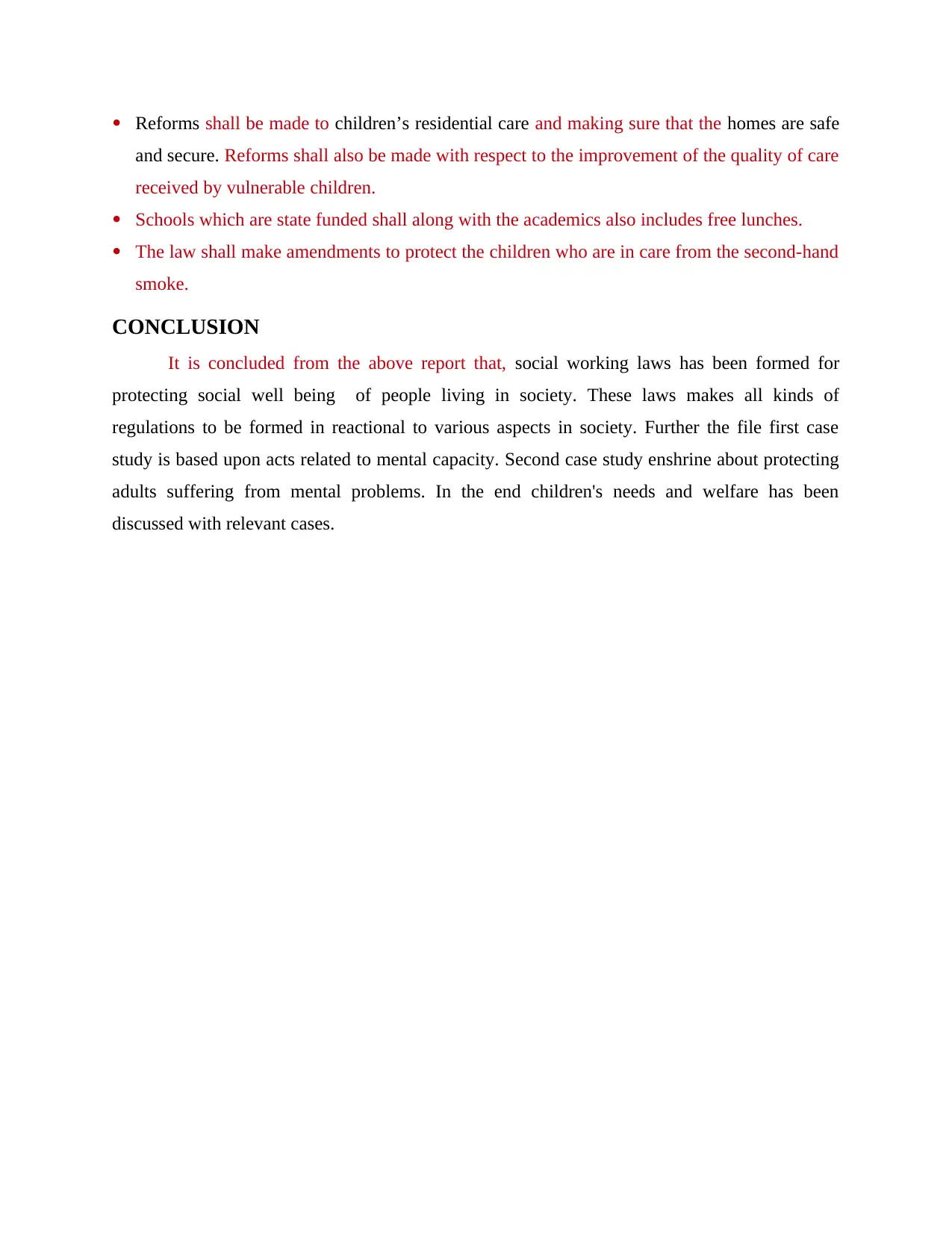
Reforms shall be made to children’s residential care and making sure that the homes are safe
and secure. Reforms shall also be made with respect to the improvement of the quality of care
received by vulnerable children.
Schools which are state funded shall along with the academics also includes free lunches.
The law shall make amendments to protect the children who are in care from the second-hand
smoke.
CONCLUSION
It is concluded from the above report that, social working laws has been formed for
protecting social well being of people living in society. These laws makes all kinds of
regulations to be formed in reactional to various aspects in society. Further the file first case
study is based upon acts related to mental capacity. Second case study enshrine about protecting
adults suffering from mental problems. In the end children's needs and welfare has been
discussed with relevant cases.
and secure. Reforms shall also be made with respect to the improvement of the quality of care
received by vulnerable children.
Schools which are state funded shall along with the academics also includes free lunches.
The law shall make amendments to protect the children who are in care from the second-hand
smoke.
CONCLUSION
It is concluded from the above report that, social working laws has been formed for
protecting social well being of people living in society. These laws makes all kinds of
regulations to be formed in reactional to various aspects in society. Further the file first case
study is based upon acts related to mental capacity. Second case study enshrine about protecting
adults suffering from mental problems. In the end children's needs and welfare has been
discussed with relevant cases.
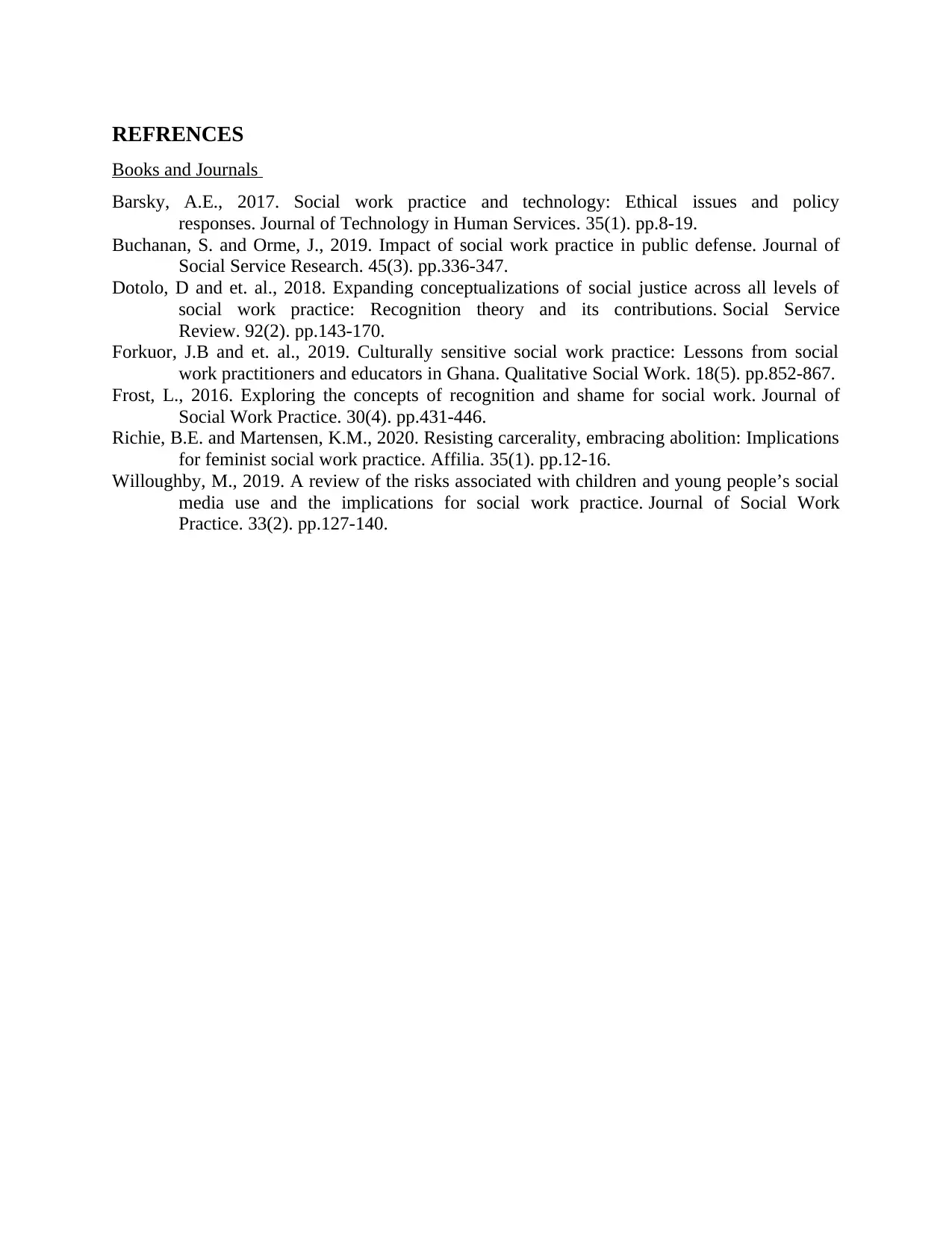
REFRENCES
Books and Journals
Barsky, A.E., 2017. Social work practice and technology: Ethical issues and policy
responses. Journal of Technology in Human Services. 35(1). pp.8-19.
Buchanan, S. and Orme, J., 2019. Impact of social work practice in public defense. Journal of
Social Service Research. 45(3). pp.336-347.
Dotolo, D and et. al., 2018. Expanding conceptualizations of social justice across all levels of
social work practice: Recognition theory and its contributions. Social Service
Review. 92(2). pp.143-170.
Forkuor, J.B and et. al., 2019. Culturally sensitive social work practice: Lessons from social
work practitioners and educators in Ghana. Qualitative Social Work. 18(5). pp.852-867.
Frost, L., 2016. Exploring the concepts of recognition and shame for social work. Journal of
Social Work Practice. 30(4). pp.431-446.
Richie, B.E. and Martensen, K.M., 2020. Resisting carcerality, embracing abolition: Implications
for feminist social work practice. Affilia. 35(1). pp.12-16.
Willoughby, M., 2019. A review of the risks associated with children and young people’s social
media use and the implications for social work practice. Journal of Social Work
Practice. 33(2). pp.127-140.
Books and Journals
Barsky, A.E., 2017. Social work practice and technology: Ethical issues and policy
responses. Journal of Technology in Human Services. 35(1). pp.8-19.
Buchanan, S. and Orme, J., 2019. Impact of social work practice in public defense. Journal of
Social Service Research. 45(3). pp.336-347.
Dotolo, D and et. al., 2018. Expanding conceptualizations of social justice across all levels of
social work practice: Recognition theory and its contributions. Social Service
Review. 92(2). pp.143-170.
Forkuor, J.B and et. al., 2019. Culturally sensitive social work practice: Lessons from social
work practitioners and educators in Ghana. Qualitative Social Work. 18(5). pp.852-867.
Frost, L., 2016. Exploring the concepts of recognition and shame for social work. Journal of
Social Work Practice. 30(4). pp.431-446.
Richie, B.E. and Martensen, K.M., 2020. Resisting carcerality, embracing abolition: Implications
for feminist social work practice. Affilia. 35(1). pp.12-16.
Willoughby, M., 2019. A review of the risks associated with children and young people’s social
media use and the implications for social work practice. Journal of Social Work
Practice. 33(2). pp.127-140.
⊘ This is a preview!⊘
Do you want full access?
Subscribe today to unlock all pages.

Trusted by 1+ million students worldwide
1 out of 12
Related Documents
Your All-in-One AI-Powered Toolkit for Academic Success.
+13062052269
info@desklib.com
Available 24*7 on WhatsApp / Email
![[object Object]](/_next/static/media/star-bottom.7253800d.svg)
Unlock your academic potential
© 2024 | Zucol Services PVT LTD | All rights reserved.



